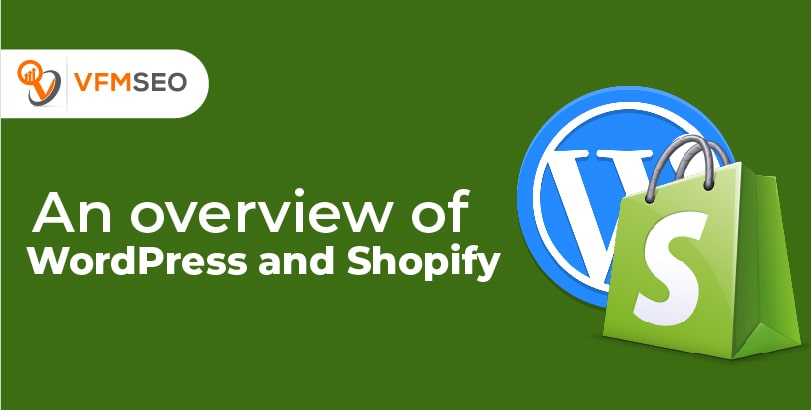
WordPress vs Shopify: Which One is best for Ecommerce in 2021
We come across two leading eCommerce website builders when choosing the top online eCommerce website builder: WordPress and Shopify. What if you want to choose between WordPress and Shopify, but you’re not sure which one is for you? Would the switch between Shopify and WordPress be better?
No platform is ever perfect. Most of the time, the platform comes with an array of great features and some limitations. The most important thing to remember is that you need to make sure your chosen platform has everything you need.
The Shopify platform allows users to create online store websites independently, while WordPress allows users to build websites, blogs, and portfolios.
Blog content & website building are two of the primary purposes of WordPress. However, the platform’s services have expanded with the addition of the WooCommerce plugin, allowing it to occupy a central place in the eCommerce realm.
So, how do you make a choice? In this blog, we will look at the differences between WordPress and Shopify that you should know before entering the world of eCommerce. But before we do that, let’s take a closer look at each platform.

An overview of WordPress and Shopify
What is WordPress?
There are two versions of WordPress depending on the type of hosting:
- Hosted
- Self-hosted
You can easily create an eCommerce website using WordPress.com, a popular blogging platform. A self-hosted solution that gives you access to advanced technical features to deploy your WordPress website with ease. Using this site, you can create any website – including online stores.
What is Shopify?
An eCommerce web application, Shopify helps merchants create & launch their online stores. Shopify’s major advantage is that users with no or limited technical knowledge can build a store without needing to resort to coding.
WordPress vs. Shopify: Comparison
Payment Processing
One of the most important aspects of any eCommerce company is payment processing. In the absence of an efficient means to collect payments from consumers, you are unlikely to be able to stay in business.
WordPress and Shopify offer credit card processing and other payment options, including Amazon Payments and PayPal. Shopify Payments, which Stripe facilitates, is included in the package. WordPress also offers features that support credit cards and payments via your bank or another merchant account, as well as directly through Stripe. Taking payments with one company differs from taking them with the other because of the fees you pay. No matter what eCommerce platform you use, you will pay a bank fee, payment gateway fee, or merchant account fee, but with Shopify, you will also pay additional fees.
It costs nothing extra to use WordPress, other than what your payment processor charges.
Customer Support
Customer support is another essential difference between Shopify and WordPress. WordPress provides excellent forum-based support, whereas Shopify offers excellent chat, email, and phone support. Usually, you will receive a swift response from i want to buy klonopin their customer care service based on your query. In that case, you may post your urgent questions in the forum in order to reach them at any time.
There are several forums and blogs dedicated to WordPress where you can often find solutions to your questions. It makes it easy for you to find answers to your questions quickly while discriminating between excellent advice and outdated or inadequate information.
Search Engine Optimization
If you want to attract new customers looking for what you offer on Google, search engine optimization (SEO) is critical. We won’t delve into great detail on SEO because it is such a broad topic, but we can point out a few distinctions. With WordPress, you’ll have more control over the various aspects of your site that affect your SEO because the platform is more versatile and has so many plugins. With Shopify, you can change most of the important components, but with WordPress, you won’t have full control over everything.
Conversion Rate Optimization
When your site is open for business and you’ve collected some data on your visitors, you can begin conducting conversion rate optimization (CRO) to enhance your business. This data includes what site visitors are searching for and how well they convert those searches into purchases. Due to its flexibility, WordPress has an advantage in this respect. Shopify, on the other hand, allows you to test fewer things and will limit you because it is mainly used to run an eCommerce store.
WordPress can be viewed as an experiment platform, where you can experiment with different types of content, customized landing pages, and many other features. In addition, you can use CRO plugins to automate A/B testing and other tasks.
Plugins
ECommerce merchants benefit greatly from WordPress plugins because they simplify otherwise complicated processes. WordPress has a plugin that turns regular WordPress sites into eCommerce shops with all the features of e-commerce sites. There will still be items to add, but the process will be much more straightforward. Similarly, different plugins are available for different purposes. For example, Yoast SEO is used to optimize websites and content; WordPress Mailchimp can be used for email marketing, and WordPress Google Analytics is used to monitor shop performance. Shopify’s coding, however, should be your focus for integrating plugins; otherwise, you’ll have trouble expanding your product line. While WordPress allows you to create a site that is unique on the platform without a lot of technical knowledge, you will need to know a great deal of coding to do that.
Final Words
You must decide which is better, Shopify or WordPress, based on your business needs. WordPress provides you with greater control over your website if you want greater flexibility and scalability.
Additionally, if your website is pre-built on WordPress, you won’t have to worry about migrating to the eCommerce version or merging two separate websites into one.

